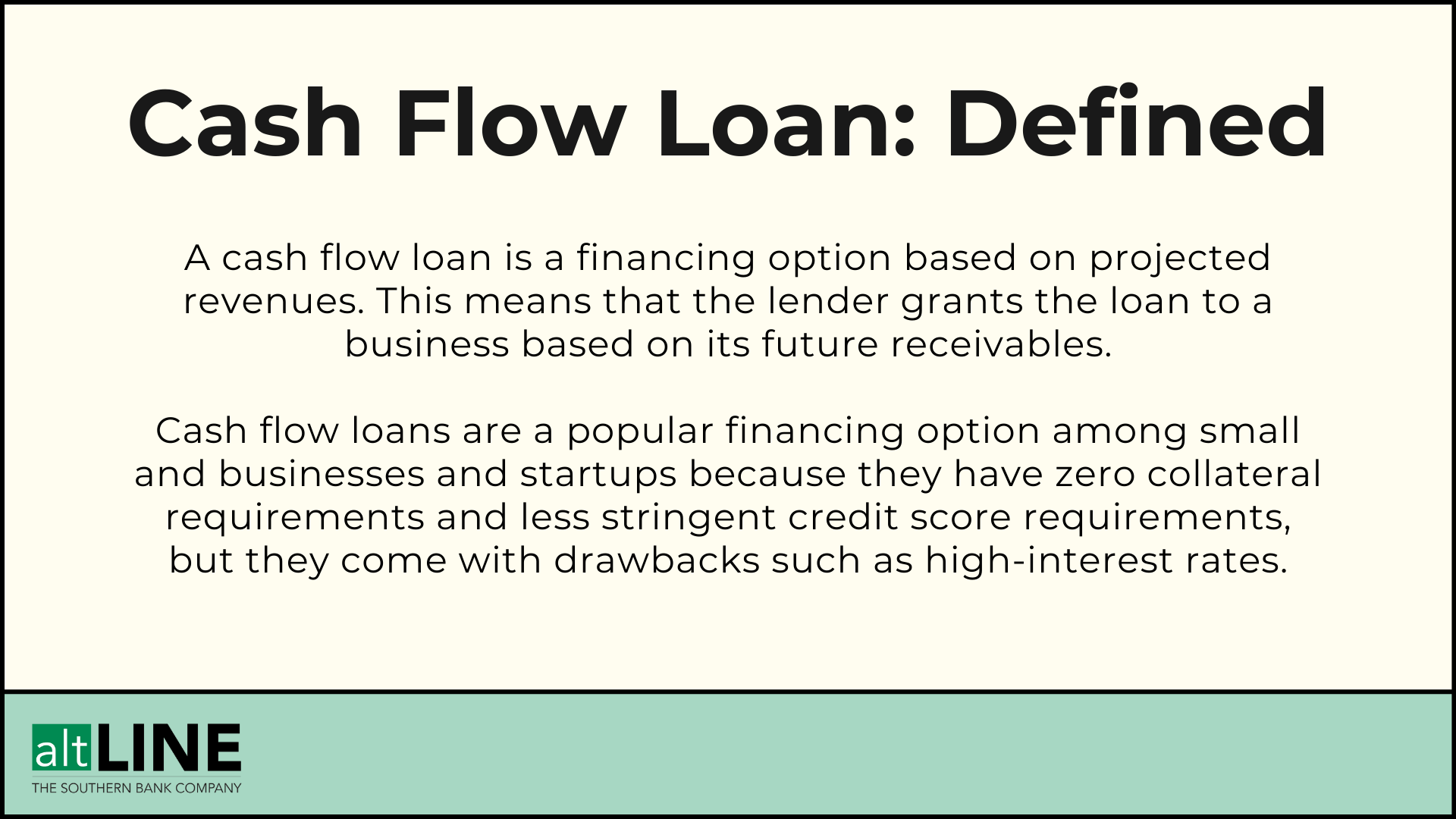Last Updated August 14, 2025
Whether you want to fulfill payroll obligations, open a new business branch, or invest in a promising opportunity, a cash flow loan can be an excellent way to finance your capital needs.
Confused about cash flow loans and how they work? Here’s an in-depth guide covering everything from what a cash flow loan is, to the advantages and disadvantages associated with them, along with the options available.
What Is a Cash Flow Loan?

Cash flow loan is a financing option available to businesses based on projected revenues. That essentially means the lender grants the loan based on the borrower’s anticipated receivables.
Cash flow loans are a popular financing option among small and medium-sized businesses and startups because they have zero collateral requirements and less stringent credit score requirements.
Before underwriting a cash flow loan, lenders typically evaluate a company’s expected future revenue, credit ratings, and even how long you’ve been in business. However, note that your chances of approval are often heavily dependent on how strong your future cash flows look, although your credit rating matters.
They often have higher interest rates and origination fees, and in some instances, you might have to sign a blanket lien as part of the agreement.
Advantages of Cash Flow Loans
Here is why cash flow loans are usually an appealing option for most businesses:
- No collateral: Instead of physical assets, lenders often leverage anticipated revenues as collateral. Thanks to this, they are an excellent option for small businesses and startups that need capital to invest in growth opportunities but lack hard assets to offer as collateral.
- Quick turnaround times: Without physical collaterals needed, a cash-flow based loan eliminates processes like asset appraisal, and has far less paperwork, meaning a lender can underwrite it in less than a week.
- Less emphasis on credit score: Lenders are usually more concerned about your future account receivables than your credit score. Even with a low rating, you may still get approved as long as your business shows the potential for steady growth and increased revenues.
- Multiple loan options: From term loans, merchant cash advances to credit lines, most lenders offer multiple loan options so you can quickly identify the best choice for your enterprise.
- Fuels business growth: With no collateral required, less documentation, and quick approval times, cash flow loans allow you to capitalize on growth opportunities and optimize your business operations for growth.
Disadvantages of Cash Flow Loans
There’s always a catch with any loan, and cash flow loans are no exception. Here are some common downsides of a cash flow loan:
- High-interest rates: Since the borrower’s ability to pay back relies on business performance, lenders often account for risks brought by either industrial or economic cycles, which means higher interest rates. For most lenders, this often ranges between 11.9% and 90%. Also note, the origination fee for cash flow loans is usually higher compared to traditional loans.
- Strong business history: If you only recently opened your small business, you cannot qualify for a cash flow loan as most lenders require borrowers to have been in business for at least six months.
- Automatic payments: Some lenders offer cash flow loans with automated payments as a prerequisite. That means they’re legally allowed to take a predetermined amount out of your earnings whether or not your business is doing well. For small and medium-sized companies, that may mean not having enough funds to cover operational costs.
- Not ideal for long-term investment: Cash flow loans are suitable for short-term capital requirements such as investing in a good opportunity or hiring new employees. For long-term and capital intensive investments, consider other loan options.
Best Uses for Cash Flow Loans
Businesses might seek out a cash flow loans for many reasons.
Cover Cash Flow Gaps
Building cash reserves is the easiest way to cover gaps. But not every business can afford to build and maintain these reserves.
For instance, if you’re experiencing a cash flow gap due to unpaid invoices or because your business is seasonal, a cash flow loan is an excellent way to cover your operational costs and keep your business running.
Invest in New Growth Opportunities
As cliché as it sounds, opportunity only knocks once, and in business, that could be the breaking point you’ve been waiting on. That said, with a cash flow-based loan, you can invest in promising opportunities and even expand your business to new locations.
To Capitalize on Cost-Saving Opportunities.
Besides growth opportunities, a cash flow loan also comes in handy when a chance to cut on high costs comes up. For instance, if you need a new delivery car for your business and there’s a sale coming up, but you lack the funds, a cash flow loan is your chance to capitalize on it.
Since most suppliers and vendors offer great discounts on goods bought in bulk, this type of Loan also allows you to maximize such offers.
Cover Hidden Costs of Business Expansion
Cash flow-based loans also come in handy when you need to cover the immediate costs of business growth, such as hiring new staff, increased payroll taxes, and office expansion expenses.
Emergency Expenses
Regardless of how well-put or established your business is, life is unpredictable and may surprise you with business emergencies that require immediate financing. Cash flow loans come in handy if you’re yet to build an emergency cash reserve.
Types of Cash Flow Loans
Understanding the types of cash flow loans available makes it easier to select the most appropriate solution. Check out the three main types alongside their pros and cons below:
Business Line of Credit
A business line of credit is the most flexible type of cash flow loan. It’s often issued by traditional lenders and online lenders and works as a business credit card. That means you may withdraw cash as needed until you reach the limit, repay it, and continue borrowing again.
However, it has higher limits than a standard credit card. Interest rates typically range between 5% and 15%. Funding may happen in as few as seven days, and the repayment period is between one and three years.
The primary advantage of a business line of credit is that you don’t have to spend all the money you borrow, and you only pay interest on the amount spent. Also, you may readjust the amounts paid to fit your cash flow and budget needs. Depending on your lender, you may even earn cashback or rewards for spending the money.
To qualify, you’ll need to have been in business for at least six months or have at least $25,000 in yearly revenue. Also, most lenders will expect you to submit both personal and business bank account, and tax returns information, as well as your company’s financial statements.
A business line of credit boosts your company’s purchasing power and is best suited for short-term capital needs or to cover operational costs. For instance, it’s ideal for seasonal businesses as they can use it to cover overhead expenses and maintain normal operations even during off-peak seasons.
Pros of a Business Line of Credit
- Higher cash limits
- Interest rates only apply to money spent
- Boosts credit rating
Cons of a Business Line of Credit
- Higher interest rates
- Tricky to qualify for if you’re a new startup or if you don’t make enough revenue
- Potential for fund misuse
Related: Line of Credit vs. Invoice Factoring
Business Term Loans
As the name implies, a short-term loan has a short repayment schedule and is offered as a one-time lump sum. The interest rate can either be fixed or variable, and you may need to put a down payment to reduce amounts payable and overall loan costs.
Term loans are often paid in installments, and depending on the type, can have a repayment period ranging between five and ten years. Types of term loans include:
- Short term: Typically have a one-year repayment period, but some financial institutions offer up to 18 months
- Intermediate-term: With this option, borrowers may get up to three years to pay back the money
- Long-term: These kinds of loans can have a repayment period of up to 25 years but often require collateral and may limit the financial commitments your business can take on.
Although qualification requirements vary, most short-term loan lenders often expect you to have a robust business plan, excellent annual revenue, and a good score.
Pros of a Business Term Loan
- Longer and flexible repayment terms
- Lower monthly installments
- You may finance an array of business needs
Cons of a Business Term Loan
- May require collateral and personal guarantees
- Could only offer variable interests
- Some loans might feature prepay penalties
Merchant Cash Advance
A merchant cash advance isn’t your standard cash flow loan. The lender offers specific cash amounts based on future revenue projections. In return, the borrower repays through a predetermined percentage of their sales. A factoring fee might also be added to the bill.
Merchant cash advance loans have a quick turnaround time, and you may even get the cash within 24 hours. Also, you may be approved for a loan amount worth up to 70% of your average monthly sales revenue, and you only pay the amount you owe.
The catch? Repayments are automatic, meaning each time a customer pays using a credit card, a percentage of the amount automatically goes to the lender. This might leave you with even more cash flow issues. A merchant cash advance works best for enterprises with a high volume of sales by card.
Pros of an MCA
- Faster approval times
- No fixed monthly installments
- You only pay the amount owed
Cons of an MCA
- Automatic payments
- You cannot qualify without a merchant account
- High-interest rates
Differences Between Cash Flow Loans vs. Traditional Bank Loans
The differences between cash and asset-based loans lie in the following:
How the Loan Is Secured
The primary difference between a cash flow and a traditional loan is how the lender secures them. A cash flow loan is secured against future revenues, while a conventional loan in most instances requires collateral.
Minimum Credit Requirements
With a traditional loan, a healthy credit rating is one of the prerequisites of approval. For cash flow loans, lenders are often more interested in your business’s performance than the rating.
Loan Process and Approval Times
Traditional loan lenders must first conduct an asset appraisal and review your financial information meaning approval takes time. You may even wait up to a month before your loan is approved.
On the other hand, with a cash flow loan, approval is easy since you only need to prove your company’s financial health. With some cash flow loan options, you may even get approved within 24 hours.
How to Figure Out Which Type of Cash Flow Loan is Right for Your Business
Now that you know what it is, how it works, and even common types, how do you figure out the best type of cash flow loan? Well, it comes down to your business requirements and operations.
For instance, if you run a seasonal enterprise, a business line of credit would be ideal since it allows you to get consistent cash to cover operational expenses only when necessary.
But if you’re looking to invest in a growth opportunity or buy inventory in bulk, a short-term loan is better since you get the cash as a one-time lump sum.
Besides business needs, also consider the following to determine the right type of cash flow loan:
- How fast you need the loan
- The interest rate charged
- Extra costs and fees
- Whether you have to sign a personal guarantee
- Repayment terms
- The stability of your enterprise
Jim is the General Manager of altLINE by The Southern Bank. altLINE partners with lenders nationwide to provide invoice factoring and accounts receivable financing to their small and medium-sized business customers. altLINE is a direct bank lender and a division of The Southern Bank Company, a community bank originally founded in 1936.











